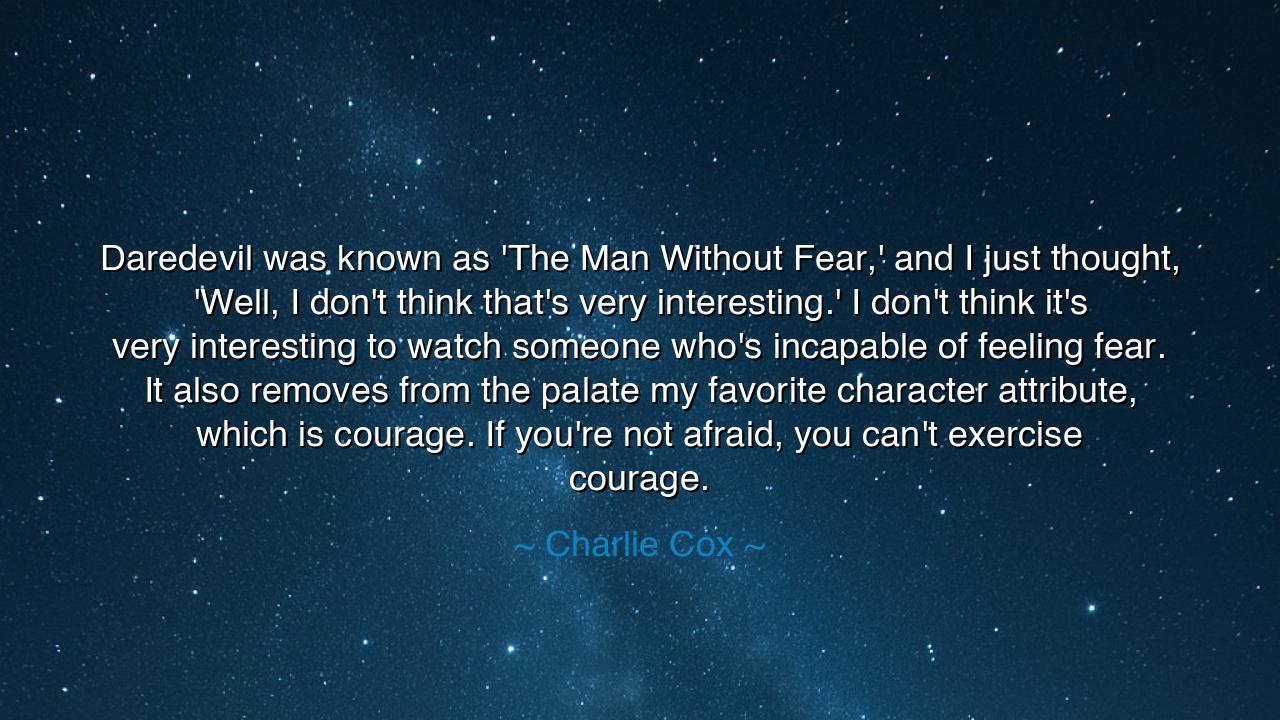
Daredevil was known as 'The Man Without Fear,' and I just
Daredevil was known as 'The Man Without Fear,' and I just thought, 'Well, I don't think that's very interesting.' I don't think it's very interesting to watch someone who's incapable of feeling fear. It also removes from the palate my favorite character attribute, which is courage. If you're not afraid, you can't exercise courage.






The actor Charlie Cox, who breathed life into the Marvel hero Daredevil, once said: “Daredevil was known as ‘The Man Without Fear,’ and I just thought, ‘Well, I don’t think that’s very interesting.’ I don’t think it’s very interesting to watch someone who’s incapable of feeling fear. It also removes from the palate my favorite character attribute, which is courage. If you’re not afraid, you can’t exercise courage.” In these words lies a truth as old as heroism itself—a truth known to warriors, philosophers, and saints: that courage is not the absence of fear, but the mastery of it. For fear is the crucible in which valor is forged. Without fear, courage is an empty gesture, as meaningless as a sword that has never met resistance.
The meaning of Cox’s reflection transcends the world of fiction. He reminds us that the noblest acts of the human spirit arise not from the invincible, but from the vulnerable. The essence of courage lies in standing firm despite trembling hands and racing hearts. It is the choice to act when instinct calls for retreat. To imagine a man utterly without fear, as Cox says, is to imagine a creature without struggle, without inner conflict, without growth. And what is heroism without struggle? What is light without the memory of darkness? Fear, then, is not the enemy of courage—it is its foundation.
The origin of this wisdom lies deep in human history. From the dawn of civilization, courage has been celebrated not in those untouched by fear, but in those who rise above it. The Greeks called this virtue andreia, the strength of soul that remains steadfast amid danger. Aristotle himself taught that courage exists in the perfect balance between recklessness and cowardice. The reckless man knows no fear because he is blind to danger; the coward knows only fear and flees before it. But the truly courageous man feels fear keenly and yet acts rightly in its presence. Thus, even in the myths of Achilles or Odysseus, the hero’s worth is not in being fearless, but in facing dread with resolve and purpose.
Consider the story of Sir Ernest Shackleton, the Antarctic explorer whose expedition, Endurance, became a triumph of courage over despair. When his ship was trapped and crushed by ice in 1915, he and his men faced certain death in one of the most desolate places on earth. Shackleton was not fearless—he feared hunger, frostbite, and the loss of his crew. But he did not let that fear dictate his soul. Instead, he turned it into vigilance, determination, and hope. For nearly two years, through blizzards and starvation, he led his men home without the loss of a single life. His greatness did not lie in being immune to fear, but in wielding it as a compass toward courage and endurance.
In the realm of art, as in life, the characters who endure in our hearts are those who embody this struggle. We are moved not by gods who cannot fall, but by mortals who rise after falling. When Charlie Cox speaks of Daredevil, he speaks of a hero defined not by his invulnerability, but by his humanity—a blind man who feels fear, pain, and doubt, yet chooses to fight nonetheless. It is the act of choosing—the conscious defiance of fear—that transforms ordinary beings into heroes. As the ancients would say, “A man is not measured by what he feels, but by what he dares.”
Cox’s insight also reveals a profound spiritual truth: that fear itself can be a teacher. To feel fear is to be alive, to care deeply, to stand before something larger than oneself. It reminds us of our limits—and in doing so, it points us toward transcendence. The fearless are numb; they cannot know the taste of triumph, because they have never faced the possibility of defeat. But those who tremble and still move forward, who hear the voice of fear and answer with resolve—these are the ones who know the meaning of courage, and in that courage, the fullness of life itself.
The lesson, then, is this: do not wish to be without fear; wish instead to act rightly in its presence. When fear arises, do not shrink from it, but let it sharpen your purpose. Fear is the shadow of what you value most—honor, love, freedom, truth. Let that knowledge guide you. When your heart trembles before a challenge, say to yourself, “Here lies the doorway to my strength.” Every act of courage begins with fear, and every great life is built upon the quiet decision to walk through it.
So let it be known to those who come after us: courage is not the absence of fear, but the mastery of it. As Charlie Cox reminds us, to be human is to feel fear—and to rise above it is to become something greater. The heroes we honor, the legacies we build, and the peace we earn are all born in that sacred space between trembling and triumph. Therefore, when fear stands before you, do not curse it. Bow to it, learn from it, and then, with steady breath and open heart—act.






AAdministratorAdministrator
Welcome, honored guests. Please leave a comment, we will respond soon